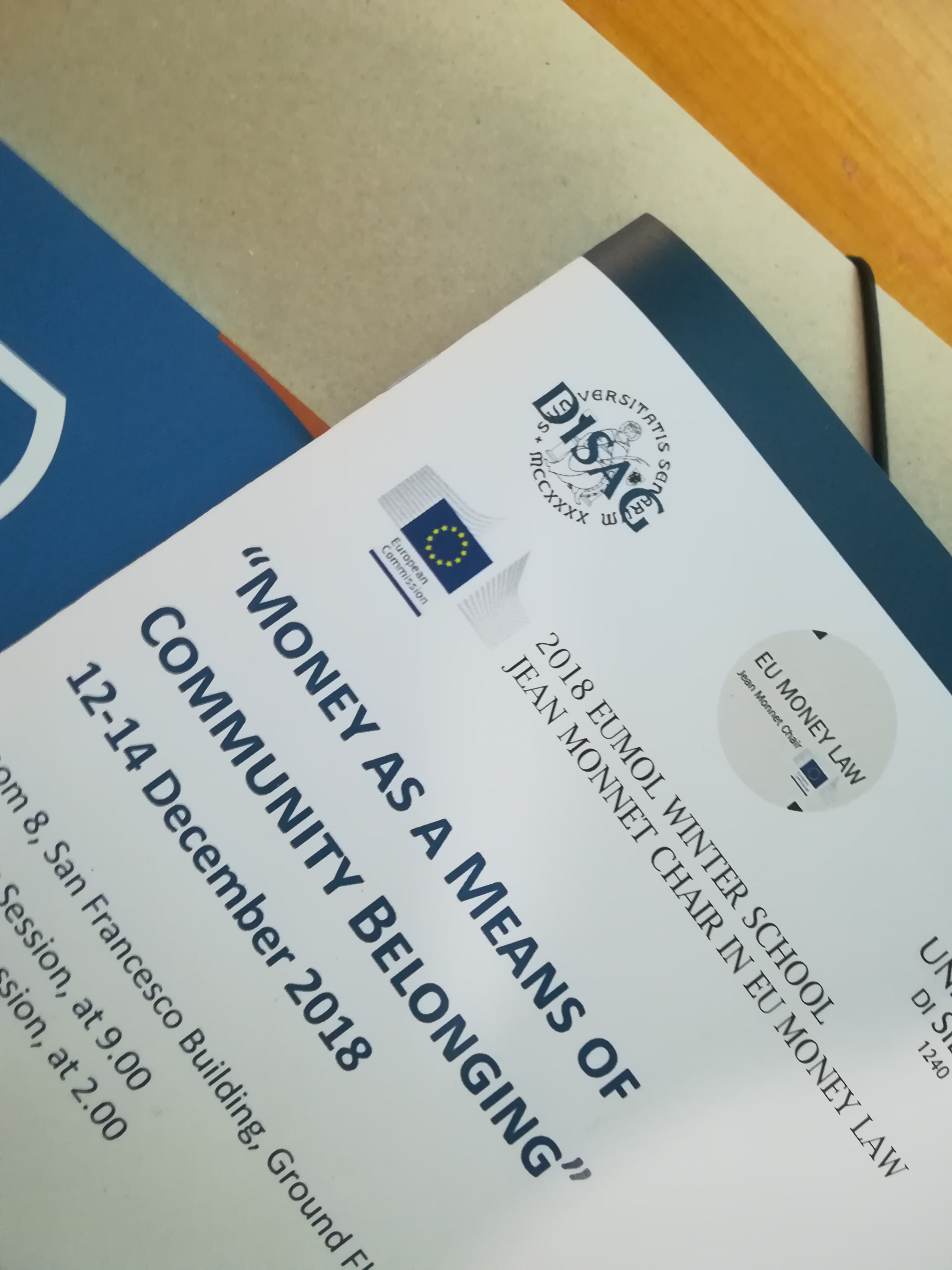Money as a means of community belonging
12–14 December 2018
Among the other teaching activities, Jean Monnet Chair in EU Money Law (EUMOL) provides for a yearly 20 teaching hours course, addressed to the university students, both bachelor and master degree students, as well as ph.d. candidates, but it is also addressed to policymakers and academics.
The first edition of EUMOL WINTER SCHOOL is held from 12 to 14 December 2018, at San Francesco buildings in Piazza San Francesco, 7, Siena. San Francesco buildings represent the seat of Business and Law Department of the University of Siena, hosting the EUMOL project is accommodated, and where the Jean Monnet Chair holder, Dr Gabriella Gimigliano, works as senior researcher in business law. (or: where I, as Jean Monnet Chair holder, work as senior researcher in business law).
The main objective of the 2018 EUMOL Winter School was/is to investigate, according to an interdisciplinary approach, money as a social institution. This means that the monetary regulatory framework or, in other words, the regulatory framework for the contracting relationship between the payment service provider and the service user, the role of the payment service users within the payment systems and the use of users’ monetary data, are extremely important to build up a safe, inclusive and pluralist “internal market” within the European Union and may influence how everyone (consumers and entrepreneurs) live the community identity as Europeans.
This is the reason why the European Union went beyond the negative harmonisation process and in the mid-80s began a positive harmonisation process. This process was initially based on soft rules and later on compulsory rules, especially, minimum harmonisation directives. Later on, the institutional reguatory actions were matched up with self-regulatory initiatives (SEPA rules books) and now they are, together with the Court of Justice case law and the EBA technical guidelines, the backbone of the “internal market” for payments.
Which factors may influence Europeans’ money identity? I think that it is influenced by money history in Europe, by the role of financial and especially banking intermediation, by the religious and cultural values, by the monetization of the data as well as the technical innovations, but also the role of the central banking and the national legal traditions in the field of monetary obligations. With a view of investigating such factors, the 2018 WINTER SCHOOL has been organized in 6 workshop sessions, each with a different colour, one in the morning and another in the afternoon, matching lectures with roundtables.
12 December, 9.00 a.m. – 1.00 p.m.: Green Workshop Session on “The European Union, money and financial market: ld and new regulatory challenges”
12 December, 2.00 – 5.00 p.m.: Red Worksjop Session on “Europe and the roots of money, a community construction process”.
13 December, 9.00 a.m. – 1.00 p.m., Brown Workshop Session on: “Market, Regulations and Innovations in Payments”
13 December, 2.00 – 5.00 p.m., Blue Workshop Session on: “Private and public issues of money and monetary obligations”
14 December, 9.00 a.m. – 1.00 p.m., Yellow Workshop Session on “Money and Data: collecting, protecting and exchanging personal data”
14 December, 2.00 – 5.00 p.m., Grey Workshop Session on “Complementary Currencies and Sardex Case”.
For each year, some Key teaching staff members will join the workshop. This year, there will be Dr Valentino Cattelan, Prof. Gloria Gonzalez Fuster and Dr Luisa Brunori. With them, some invited lecturers and those academics who had successfully submitted their paper proposals for the 2018-19 EUMOL call for papers.
In the middle, the Jean Monnet Chair in EU Money Law provided for a light lunch, where lecturers and university students could friendly meet each other and talk.
It is worthy of note that a large numbers of students, enrolled in the workshop, were in charge of performing some tasks. Indeed, they were organized in small groups and each group was in charge of attending at least one workshop day and performing three activities: asking at least one “structured” question when the floor was open, conducting a video interview with one (or more) guest(s), writing a 800-words report (about the workshop session they attended).
About 2018 Edition:
- Workshop Programme
- Teaching Staff
- Gallery
- Presentations
- Video Interviews conducted by students


